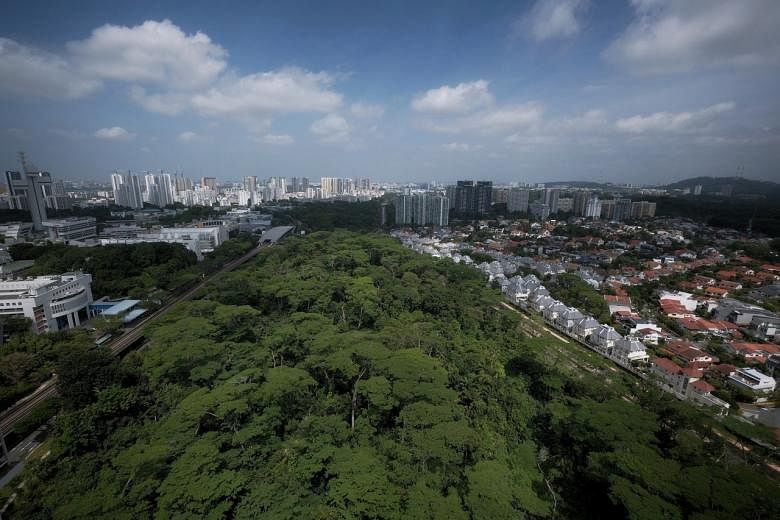SINGAPORE - The Housing Board's decision to not develop half of Dover Forest for now and instead safeguard it as a nature park is a win not just for nature groups and nature, but also for present and future Singaporeans, said conservation experts and Dover residents.
Nature Society (Singapore) president Shawn Lum told The Straits Times on Friday (July 30): "A Singapore with vibrant nature, retained without sacrificing key development needs, is a better Singapore.
"Dover Forest is for everyone - residents of the new HDB estate (to be launched in 2022), residents who live in the vicinity of Dover Forest, and people all over Singapore who will be able to discover a beautiful, life-giving, restorative, and accessible nature space."
The HDB had on Friday morning announced that it had revised plans for the 33ha Dover Forest, with public housing expected to be launched in the eastern half next year while the western half is to be left to preserve its biodiversity.
The young secondary forest plot in western Singapore has been zoned for residential use since 2003, but plans were tweaked after scientific studies and nature enthusiasts flagged its conservation value.
Among those who submitted alternative proposals for the site was Nature Society (Singapore), which in January proposed that the forest be retained as a "public-cum-nature park".
In announcing its plans, the HDB said it had taken into account two studies, including one by the National Parks Board (NParks) that modelled how the Dover plot connects with other forests in Singapore.
This exercise had shown that the site was an important stepping stone for wildlife moving in from Bukit Timah Nature Reserve north of the site and from the vegetation in the Southern Ridges further down.
Dr Lum, who is also a botanist at the Nanyang Technological University, said: "I think of the plan as more than a compromise. It is a holistic solution to maintain the key ecological functions of the Dover Forest site, both as a nature area in its own right and also as key component of connectivity for nature."
He noted that the HDB also has plans to retain a freshwater stream that runs through the eastern sector. "The developed site will also be a place where urban nature might thrive," he said.
Members of the public such as Dover resident Sydney Cheong also weighed in on the fate of the forest.
Mr Cheong had appealed for the forest to be left untouched, and an online petition he started has received more than 50,600 signatures since January.
Said the 52-year-old of the HDB's announcement: "Although only about half of the forest will be protected as a nature park and wildlife corridor, it is still important for wildlife conservation in Singapore."
He added: "To preserve wild areas is never easy, especially in a country where land is limited."
He said that given the country's many land use needs, it was important that the authorities consulted stakeholders in their decision-making process, and that he was appreciative of the HDB's efforts on this front.
Last December, the board published a report of the site environmental baseline study it had conducted and sought public feedback.
Over two feedback windows totalling about eight weeks, it received about 1,800 responses.
Mr Karl Png, 24, co-founder of nature group Singapore Youth Voices for Biodiversity, said the involvement of the wider public and Dover residents in the HDB's decision-making process was a major success for his group, especially with the question about the future of both Dover Forest and the nearby Clementi Forest raised in Parliament earlier this year.
"It shows that everyone has a stake and has the opportunity to speak," he said.
While he described putting off development plans as the ideal scenario, he acknowledged that it would be difficult given Singapore's land use needs.
"During this process, I have accepted that you cannot win everything. But the outcome is still a small win and shows that the efforts of those pushing for conservation was not all for nothing," said Mr Png, a biology undergraduate.
He said that as a Dover resident himself, he empathised with young house-hunters hoping to buy a flat in the area to live close to their families.
"I wouldn't want to be the one to deny young families new homes in the area, and I also would not rule out myself or my siblings wanting to live in the new flats as well," he said.
"Maybe it is an ironic position to be in as a nature advocate, but I still tried my best to push for the retention of the forest."
Meanwhile, mammal scientist Marcus Chua of the National University of Singapore said the decision to retain half the forest as a nature park "is significant on many counts especially for biodiversity conservation and climate change mitigation" and that it provides "a natural space for recreation".
"In a time when there are challenges of biodiversity loss, climate change and developmental needs, this decision is rather 'bang for the buck' and addresses all these issues while also making the new development more liveable."
Dr Lum suggested that the revision of the HDB's development plans for the site shows how valuable nature is to Singapore.
"Could this be a turning point that will make us all cherish nature and think of it as much a part of our identity as nasi lemak, laksa, or roti prata?" he said.
"The HDB and NParks have shown that nature belongs to all of us and benefits everyone regardless of age, ethnicity, gender, or occupation.
"I think we may be turning the corner towards a greener, ecologically richer, and even more endearing Singapore."



